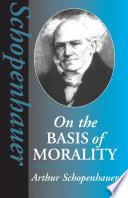Quotes from book
On the Basis of Morality

Arthur Schopenhauer
Original title
Ueber die Grundlage der Moral
(German)
On the Basis of Morality is one of Arthur Schopenhauer's major works in ethics, in which he argues that morality stems from compassion. Schopenhauer begins with a criticism of Kant's Groundwork of the Metaphysic of Morals, which Schopenhauer considered to be the clearest explanation of Kant's foundation of ethics.
